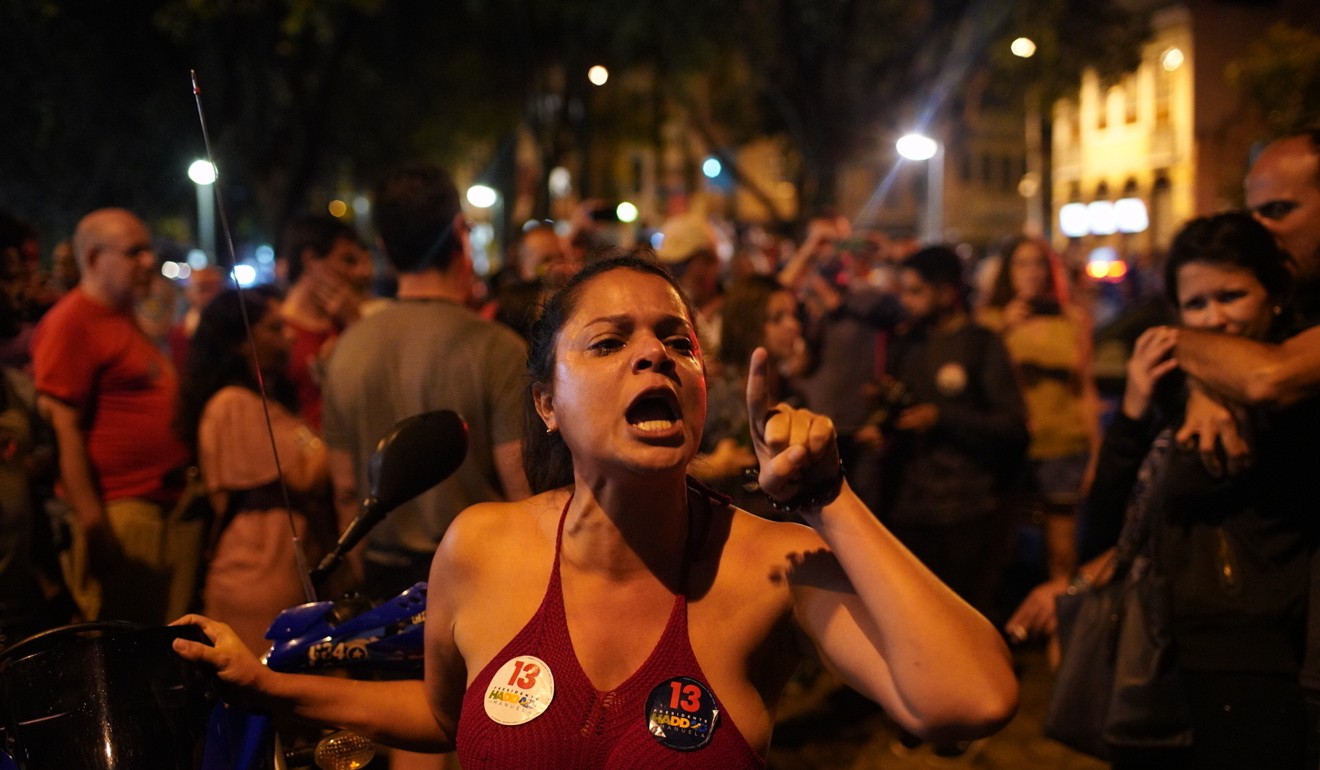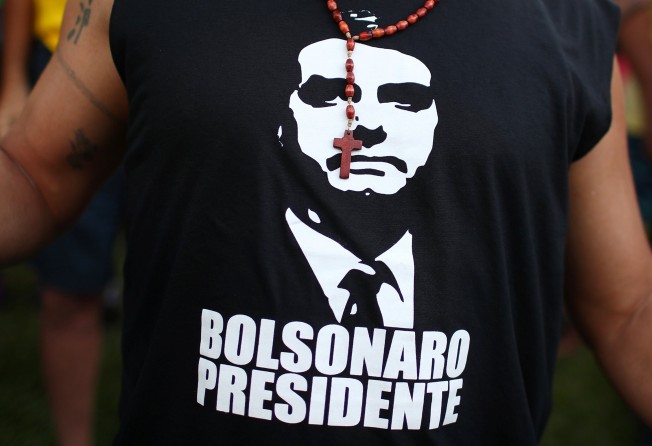
With Jair Bolsonaro victory, disillusioned Brazilians swap politics of hope for politics of anger
- Brazil’s voters followed a trend evident in embattled democracies around the world
- Bolsonaro’s candidacy benefited from preference among voters for a maverick ‘disrupter’

Jair Bolsonaro’s hard-right campaign for Brazil’s presidency shocked outside observers, who asked how a candidate with such extreme views could command broad popular support.
But Brazil’s voters appear to have followed a trend evident in embattled democracies around the world, swapping the politics of hope for “anti-politics” – the politics of anger, rejection and despair.
In office for eight years, Luiz Inácio Lula da Silva, Brazil’s jailed former president and founder of the Workers’ party (PT), pledged to enact radical change through sweeping social reforms.
But like Venezuela’s Hugo Chavez, Mexico’s Enrique Pena Nieto, and many American and European politicians of left and right who also promised a rosier future, Lula failed to deliver – and left a trail of disillusionment in his wake.
According to pre-election polls, 25 per cent of those who backed Bolsonaro did so not because they admired him or his policies, but out of determination to punish the PT for years of misrule.
This angry mood, comparable to “throw the bums out” sentiments in recent US elections, presented the PT’s new standard-bearer, Fernando Haddad, with an uphill battle.
It was no longer a question of left or right, more a wholesale rejection of politics-as-usual.
Bolsonaro’s candidacy benefited from another trending electoral phenomenon: a preference among voters for a political outsider or maverick “disrupter” who challenges the status quo.

Donald Trump was the quintessential “none-of-the-above” candidate in the US in 2016. As with Trump, many voters did not really like Bolsonaro. But they preferred him to any “establishment” figure.
Parallels have been drawn between Bolsonaro and Mexico’s left-wing president-elect, Andres Manuel Lopez Obrador.
Their political outlook is profoundly different. But as analyst Moises Naim noted: “both have crafted a persona as outsiders, as radical voices largely excluded by the ruling political elites”.
Bolsonaro is no neophyte, rather a seven-term congressman. His trick was to reinvent himself as a mould-breaker.
Anxious to believe his claims to be on their side, many alienated voters also ignored, or forgave, Bolsonaro’s misogynistic, homophobic views and his attachment to violent solutions.

A parallel can be found in the Philippines, where an arch-disrupter, Rodrigo Duterte, was elected in 2016 on a promise to eliminate drug dealers.
This turned out to mean death squads.
Bolsonaro’s pledges to re-establish law and order and eradicate corruption, by any means, echoed the concerns of voters everywhere who, fearful for their security and under siege economically, feel trapped and betrayed by past government failures, broken promises and bureaucracy.
As in Europe, most present-day voters did not experience Brazil’s 20th century era of dictatorship, and thus appeared unfazed by Bolsonaro’s authoritarian ideas.
Brazil’s election provided evidence, to add to that from other countries, that at times of severe stress – Brazil is suffering a severe recession and record crime rates – the decisive importance of “identity politics”, defined by gender, race and sexual orientation, can be overestimated.
Despite his objectionable views, Bolsonaro’s estimated support among women voters was as strong, or stronger, than Haddad’s.

Some black and gay voters also backed him, saying other issues mattered more. His advocacy of “traditional family values”, including religious faith, went down well with voters for whom such issues are key determinants.
About 85 per cent of Brazilians identify themselves as Christians while the number belonging to evangelical denominations has grown rapidly in recent years.
Many such voters appeared responsive to Bolsonaro’s messages about moral and social standards – concerns that secular political elites tend to overlook.
According to Matias Spektor, a professor of international relations in Sao Paulo, Brazil shared something else with elections elsewhere: fake news.
Disinformation, from all sides, had flourished on social media, largely unchecked by financially-struggling traditional media outlets.
“In the last few weeks of campaigning, abuse and violence against journalists has been commonplace, and Bolsonaro has fuelled anger against the press,” Spektor wrote.
Brazil’s election replicated familiar nationalist-populist themes with which voters from the US to Europe to Brexit Britain can readily identify.
But Bolsonaro’s intolerant, aggressive political brand sets him apart.
Here was no rightwing populist, in the style of Argentina’s Carlos Menem or Italy’s Silvio Berlusconi, but a neo-fascist more closely resembling Joseph Goebbels, said author Federico Finchelstein.
“Unlike previous forms of populism (on the left and right) that embraced democracy and rejected violence and racism, Bolsonaro’s populism harks back to Hitler’s time.”